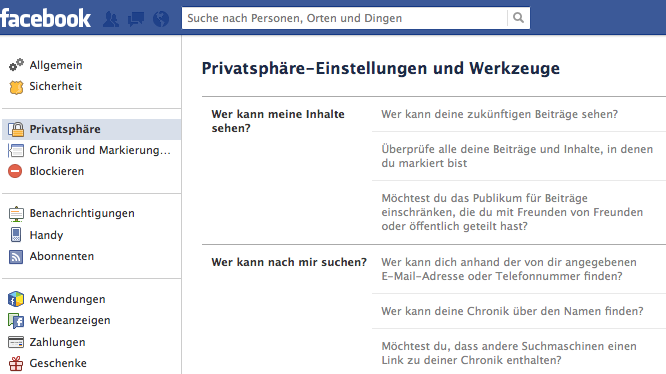Table of contents
Merry Xmas!
Privatsphäre im Internet?
mspro hat schon vor einiger Zeit zehn Thesen zum "Neuen Spiel" aufgestellt, in denen er unter anderem feststellt:
Datenschutz ist bankrott. Es macht keinen Sinn mehr, Leute davon abhalten zu wollen, Daten zu sammeln und/oder auszuwerten. Wer mit genug Macht ausgestattet ist, wird sich über Regelungen hinwegsetzen, nur die Zivilgesellschaft wird in ihren Möglichkeiten beschnitten. Im Neuen Spiel ist Datenschutz das Monopolrecht auf Datenauswertung für diejenigen, die sich eh nicht an Gesetze halten.
Wir müssen uns vergegenwärtigen, warum die Überwachung im Internet eigentlich ein Problem ist, um auf die Lösung zu kommen. An sich ist es nicht schlimm, wenn ein Fremder irgendwelche Details über Dein Leben weiss. Schlimm ist es erst, wenn es sonst niemand weiss, bzw wissen soll. Denn dann kann der Fremde dieses Wissen über Dich im Fall der Fälle gegen Dich verwenden. Das wird noch verschlimmert durch den Umstand, dass dieses "Wissen" womöglich falsch sein könnte, es könnte das Ergebnis maschineller Prozesse sein, die Schlussfolgerungen aus Einzeldaten schliessen, die schlicht und ergreifend mit der Realität nichts zu tun haben.
Wenn ein Fremder also Wissen über uns hat, das andere nicht haben, dann hat er Macht über uns. Diese Macht ist umso grösser, je weniger Einfluss wir auf die Art, den Umfang und die Genauigkeit dieses Wissens haben. Natürlich gibt es Unmengen von Daten über uns, auf deren Aufzeichnung wir keinen Einfluss haben, wie IP Adressen bei Webzugriffen, Telefonnummern bei Anrufen, Standortdaten bei Mobilgeräten und dergleichen. Es gibt aber auch eine Menge Dinge, die wir durchaus beeinflussen können.
Sehen wir uns einen Screenshot an:

Bei diversen Diensten im Netz wie Facebook, Twitter, LinkedIN oder auch Xing kann man diverse Einstellungen zur Privatsphäre vornehmen. Jedoch sind diese Einstellungen nichts weniger als ein Honeypot, eine Falle, eine Lüge.
Nehmen wir an, ich hätte ein Facebookprofil und würde ein Posting verfassen, das nur von 3 ausgewählten Personen gelesen werden kann, die ich explizit einstelle. Die allermeisten Leute gehen dann in so einem Setup davon aus, dass sie unter sich sind und schreiben dort Dinge, die sie so niemals öffentlich äussern würden. Aber ist dies wirklich eine private Kommunikation? Ich weiss nicht, wie andere Leute PRIVAT definieren, ich definiere es so:
Eine Kommunikation ist nur privat, wenn niemand ausser den beteiligten Kommunikationspartnern Kenntnis sowohl vom Stattfinden als auch vom Inhalt des Kommunikionsvorgangs hat.
Wenn auch nur 1 weitere, nicht beteiligte Person Zugang zum Kommunikationsinhalt hat oder aber Kenntnis darüber erlangen kann, dass die Kommunikation stattfand, war sie nicht privat, sondern öffentlich! Das lässt sich gut anhand eines Beispiels aus der realen Welt verdeutlichen: Ich sitze im Zug und unterhalte mich mit meinem Sitznachbar über private Angelegenheiten. Eine vermeintliche private Kommunikation, jedoch können die Leute, die uns gegenüber sitzen, zuhören. Somit ist es nicht privat, weil es Zuhörer gibt.
Es ist präzise das gleiche Setup, wenn man bei Facebook oder sonstwo "privat" kommuniziert: Der Anbieter kann immer mitlesen, die NSA kann immer mitlesen, Anwälte können jederzeit Zugang zu Metadaten oder gar Inhalten erlangen, daneben die Polizei, neuerdings sogar das Ordnungsamt und werweissnichtalles. Das sind potentiell zigtausende Menschen, die die Möglichkeit haben, zuzuhören.
Das Fazit ist, dass es Private Kommunikation, wie es mspro bereits feststellte, im Internet nicht gibt, nicht geben kann. Vielleicht gab es das früher einmal, aber die Zeiten sind vorbei. Die daraus folgende Lösung missfällt mir zwar, lässt sich aber unschwer verleugnen: alles muss öffentlich sein oder nicht im Internet stattfinden oder aber verschlüsselt sein. Wenn ich nämlich jemandem in aller Öffentlichkeit irgendwas mitteile, dann weiss es jeder. Zwar hat immer noch der Diensteanbieter und die NSA und sämtliche anderen Behörden darauf Zugriff. Aber da es bereits öffentlich ist, erlangen diese Leute keine Macht über mich. Denn man ist nicht erpressbar mit Wissen, das für jedermann zugänglich ist.
Die Theorie, dass man die Geheimdienste mit Transparenz zur Strecke bringen kann, gilt daher auch in die andere Richtung: indem wir uns selbst transparent machen, verlieren Geheimdienste (und folglich Regierungen) ihre Macht über uns. Geheimnisse, die keine sind, sind wie stumpfe Messer oder nass gewordenes Schwarzpulver. Wertlos. Unnütz. Verschwendeter Plattenplatz. Und das ist der Weg - und meiner Meinung nach der einzige, der uns bleibt - mit dem wir diesem Überwachungsirrsin den Garaus machen können:
Wir müssen unsere Privatsphäre aufgeben.
Kaum vorstellbar, dass ich als militanter Datenschützer und Paranoiker, einmal zu so einer Schlussfolgerung gelangen würde. Und ich kann auch nicht sagen, dass ich bereit dazu wäre. Aber einen anderen Weg sehe ich nicht, so bitter das sein mag.
↷ 21.12.2013 🠶 #gesellschaft ⤒
Coca Cola Truck in Burg auf Fehmarn
Heute ist der Coca-Cola-Truck in Burg/Fehmarn auf dem Marktplatz. Mir persönlich ist das ja sowas von egal, aber Frauchen wollte Fottoooos haben :)
2013-12-21 - Der Truck von rechts vorn:
2013-12-21 - Der Truck von vorn:




